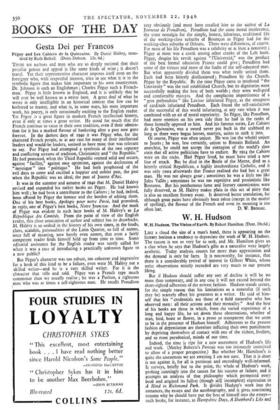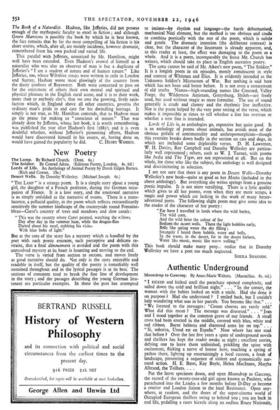W. H. Hudson
W. H. Hudson. The Vision of Earth. By Robert Hamilton. (Dent. 10s.6d.) LIKE a cloud the size of a man's hand, there is appearing on the literary horizon a tendency to depreciate the work of W. H. Hudson. The reason is not so very far to seek, and Mr. Hamilton gives us a clue when he says that Hudson's gifts as a naturalist were largely aesthetic. Today analysis counts for more than appreciation and the demand is only for facts. It is noteworthy, for instance, that there is a considerable revival of interest in Gilbert White, whose strict observations strictly recorded are very much to our present liking.
But if Hudson should suffer any sort of decline it will be no more than temporary, and in any case it will not extend beyond the short-sighted adherents of the newest fashion. Hudson stands secure, for the simple reason that his limitations as a naturalist (if such they be) scarcely affect his greatness as a writer. He said of him- self that his " credentials are those of a field naturalist who has observed men: all their actions and their mentality." And the best of his books are those in which, from the varied experience of a long and happy life, he set down these observations, whether of man, bird, beast or flower, in a prose so transparent that we seem to be in the presence of Hudson himself. Adherents to the present fashion of depreciation are therefore inflicting their own punishment by depriving themselves of contact with one of the richest, liveliest, and so most paradoxical, minds of our time.
Indeed, the time is ripe for a new assessment of Hudson's life and work. (Morley Roberts's Portrait was too intimately conceived to allow of a proper perspective.) But whether Mr. Hamilton's is quite the assessment we are awaiting I am not sure. That it is short is not against it, for all is pertinent and exceedingly well-informed. It surveys, briefly but to the point, the whole of Hudson's work, probing cunningly into the causes for his success or failure, and it attempts an analysis of that philosophy which permeated every book and attained its fullest (though still incomplete) expression in A Hind in Richmond Park. It divides Hudson's work into the romances, the essays and the autobiography, and it gives convincing reasons why he should have put the best of himself into the essays— such books, for instance, as Hampshire Days, A Shepherd's Life and
The Book of a Naturalist. Hudson, like Jefferies, did not possess enough of the mythopaeic faculty to excel in fiction ; and although Green Mansions is possibly the book by which he is best known, the fact remains that by far the most compelling of his fiction is his short stories, which, after all, are mainly incidents, however dramatic, remembered from his own packed and varied life.
This parallel' with Jefferies, unnoticed by Mr. Hamilton, might well have been extended. Even Hudson's avowal of himself as a naturalist who was also an observer of man is but a duplicate of Jefferies's " I am a student of nature and of human nature." Like Jefferies, too, whose Wiltshire essays were written in exile in London and Surrey, Hudson wrote most glowingly of the country from the dusty confines of Bayswater. Both were concerned to pass on for the enjoyment of others their own mental and spiritual and physical pleasure in the English rural scene, and it is to their work, more than to anybody else's, that we owe the growing, lively satis- faction which, in England above all other countries, governs the ordinary man's pride in and care for his dwindling heritage. It simply is not true, as Mr. Hamilton contends, that to Hudson must go the praise for making us " conscious of nature." That was already done by Jefferies, whose last book, it is worth remembering, was published the year after Hudson's first (1885); and it is even doubtful whether, without Jefferies's pioneering efforts, Hudson would have discovered himself in his essays, or, having done so, would have gained the popularity he did. C. HENRY WARREN.



































 Previous page
Previous page